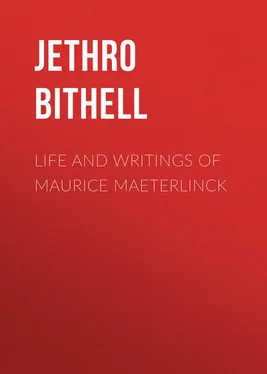Jethro Bithell - Life and Writings of Maurice Maeterlinck
Здесь есть возможность читать онлайн «Jethro Bithell - Life and Writings of Maurice Maeterlinck» — ознакомительный отрывок электронной книги совершенно бесплатно, а после прочтения отрывка купить полную версию. В некоторых случаях можно слушать аудио, скачать через торрент в формате fb2 и присутствует краткое содержание. ISBN: , Жанр: foreign_antique, foreign_prose, на английском языке. Описание произведения, (предисловие) а так же отзывы посетителей доступны на портале библиотеки ЛибКат.
- Название:Life and Writings of Maurice Maeterlinck
- Автор:
- Жанр:
- Год:неизвестен
- ISBN:http://www.gutenberg.org/ebooks/38917
- Рейтинг книги:3 / 5. Голосов: 1
-
Избранное:Добавить в избранное
- Отзывы:
-
Ваша оценка:
- 60
- 1
- 2
- 3
- 4
- 5
Life and Writings of Maurice Maeterlinck: краткое содержание, описание и аннотация
Предлагаем к чтению аннотацию, описание, краткое содержание или предисловие (зависит от того, что написал сам автор книги «Life and Writings of Maurice Maeterlinck»). Если вы не нашли необходимую информацию о книге — напишите в комментариях, мы постараемся отыскать её.
Life and Writings of Maurice Maeterlinck — читать онлайн ознакомительный отрывок
Ниже представлен текст книги, разбитый по страницам. Система сохранения места последней прочитанной страницы, позволяет с удобством читать онлайн бесплатно книгу «Life and Writings of Maurice Maeterlinck», без необходимости каждый раз заново искать на чём Вы остановились. Поставьте закладку, и сможете в любой момент перейти на страницу, на которой закончили чтение.
Интервал:
Закладка:
It would seem that Gustave Kahn has the greatest claim to priority. But it was Vielé-Griffin who popularised the new medium. Albert Mockel, too, must be mentioned. Kahn's Palais Nomades appeared in April, 1887; Mockel's first vers libres appeared in La Wallonie in July, 1887. But these poems of Mockel had been written earlier, tentative verse by a young man not so confident in himself as Kahn, and who was only induced to publish by Kahn's audacious book.
Mallarmé's attitude should be decisive. He studied the question, and reflected for a long time when he was invited to preside at a banquet offered to Gustave Kahn, in honour of the latter's book, La Pluie et le beau Temps . But, having weighed the arguments for and against, Mallarmé not only agreed to preside at the banquet, but actually to bear witness in favour of Kahn as the innovator of the vers libre – which he did in a toast reproduced in La Revue blanche .
Catulle Mendès, in his half-serious manner, suggested that the first advocacy of the vers libre was to be found in a book called Poésie nouvelle , which Lemerre brought out in 1880. The author, a certain Della Rocca de Vergalo, was a Peruvian exile living in Paris; his ideas were that lines of poetry should begin with small letters, and that the alternance of masculine and feminine rhymes should be discarded. But the founders of the vers libre , I am told, had never heard of this book. Mallarmé, it is true, had been interested in finding a publisher for it; but merely because he wished to help the author to earn money enough to take him back to Peru.
These questions of symbolism and free verse must have been discussed in the cénacle which Maeterlinck joined. Not one of the group adopted the vers libre at this time; more than one, though all had the greatest regard for Mallarmé, may be said to have remained tolerably faithful to the Parnassian prosody in after years. The symbolist element among them was represented really by Saint-Pol-Roux and Maeterlinck.
CHAPTER II
On his return to Belgium, Maeterlinck spent his winters in Ghent, in the house of his parents; his summers in the family villa at the village of Oostacker.
He now (1887) became, acquainted with Georges Rodenbach, who introduced him to the directors of La Jeune Belgique . He was in no hurry to write, however; in three years the magazine only published three poems, still in regular verse, from his pen. These were included later in Serres Chaudes , as also were the few poems in regular verse which appeared in the anthology of Belgian verse, Le Parnasse de la Jeune Belgique , published in 1887 under the auspices of La Jeune Belgique .
The fact that by 1887 it was possible to compile such an anthology is remarkable; for before 1880 Belgium, from the point of view of literature, was a desert. But in 1879 certain noisy students at the University of Louvain (Verhaeren, Gilkin, Giraud, Ernest van Dyck, 22 22 The famous Wagner tenor.
Edmond Deman, 23 23 The Brussels publisher.
and others) put their heads together and founded a bantam magazine, La Semaine des Etudiants . 24 24 The first number is dated Saturday, the 18th October, 1879, and begins with "rimes d'avant poste" by "Rodolphe" (=Verhaeren).
This magazine was the beginning of the modern movement in Belgian literature. In October of the "following year, another student, who, when his identity was disclosed, turned out to be Max Waller, brought out a hostile magazine, Le Type ; and the fight between the rivals became so merciless that the University authorities suppressed them both. Max Waller, however, nothing daunted, went to Brussels, and acquired La Jeune Belgique , a review that had been founded by students of Brussels University, made friends with his antagonists of La Semaine , and associated them with himself in the editing of his review. Georges Eekhoud, Georges Rodenbach, and other writers joined them; and La Jeune Belgique went on with its task of fighting the Philistine. Max Waller died in 1889; and when Gilkin became editor in 1891, it became the organ of the Parnassians in Belgium, while the symbolists (French as well as Belgian) enriched the pages of La Wallonie, which Albert Mockel had founded in Liège in 1886.
We have seen, from Charles van Lerberghe's letter to Adolphe van Bever, that Maeterlinck began by writing "short stories something like Maupassant's." The Massacre of the Innocents is realistic. Verhaeren, too, had discovered himself when, a student at Louvain, he read Maupassant's poems. His first book, Les Flamandes , made a critic say that the poet had burst on the world like an abcess. And the Belgians had in Camille Lemonnier a realist whose novels are as uncompromising as those of Zola. At the time when Maeterlinck began to write Lemonnier was, as they called him, the field-marshal of Belgian literature. In the spring of 1883, the jury whose duty it was to award a prize for the best work published during the last five years decided that no book had been published which was sufficiently meritorious. It was felt that this was an official insult to Belgian letters, and particularly to Camille Lemonnier, who had published various works of striking merit in the five years concerned. A banquet de guerre to Lemonnier was arranged by La Jeune Belgique , and there were two hundred and twelve subscribers. The banquet took place on the 27th May, 1883, and this event may be said to mark, not only the triumph of naturalism in Belgium, but also the fact that the élite of the Belgians were now conscious of the renaissance of their literature. 25 25 Iwan Gilkin, Quinze années de littérature .
It will be Maeterlinck's task, after his return to Belgium, to react against this naturalism, and to write works which precipitate the decay of naturalism, not in Belgium only, but in the whole world; he and other Belgians, until Belgian literature becomes, as it was in the time of chivalry, "when the muse was the august sister of the sword, and stanzas were like bright staircases climbed, in pomp and epic fires, by verses casqued with silver like knights," 26 26 Albert Giraud, Hors du Siècle .
the most discussed, the most suggestive literature in Europe. 27 27 In the thirteenth century in Germany, "Fleming" was synonymous with "verray parfit, gentil knight." The Bavarian Sir Neidhart von Reuental, for instance, refers to himself as a "Fleming."
In this reaction against naturalism in Belgium, Maeterlinck's work was hardly more effective than the dreamy poetry of Georges Rodenbach. It was not till 1887 that Rodenbach definitely left Belgium for Paris, and by that time he was a force in Belgian literature. No doubt he influenced Maeterlinck; 28 28 Cf. Rodenbach's; "Je vis comme si mon âme avait été De la lune et de l'eau qu'on aurait mis sous verre" with Maeterlinck's: "On en a mis plusieurs sur d'anciens clairs de lune." – Serres Chaudes , "Cloches de verre."
he too was a mystic and a poet of silence. Rodenbach compares his soul with half-transparent water, with the water shut up in an aquarium: "he stands in silent fear before the riddle of this 'âme sous-marine,' surmising a deep and mysterious abyss, at the bottom of which a priceless treasure of dreams is lying buried, under the shimmering surface that quietly reflects images of the world. He complains that the poor immensurable soul knows itself so little, knows no more of its life than the water-lily knows of the surface it floats on:
"'Ah! ce que l'âme sait d'elle-même est si peu
Devant l'immensité de sa vie inconnue!'
Интервал:
Закладка:
Похожие книги на «Life and Writings of Maurice Maeterlinck»
Представляем Вашему вниманию похожие книги на «Life and Writings of Maurice Maeterlinck» списком для выбора. Мы отобрали схожую по названию и смыслу литературу в надежде предоставить читателям больше вариантов отыскать новые, интересные, ещё непрочитанные произведения.
Обсуждение, отзывы о книге «Life and Writings of Maurice Maeterlinck» и просто собственные мнения читателей. Оставьте ваши комментарии, напишите, что Вы думаете о произведении, его смысле или главных героях. Укажите что конкретно понравилось, а что нет, и почему Вы так считаете.












